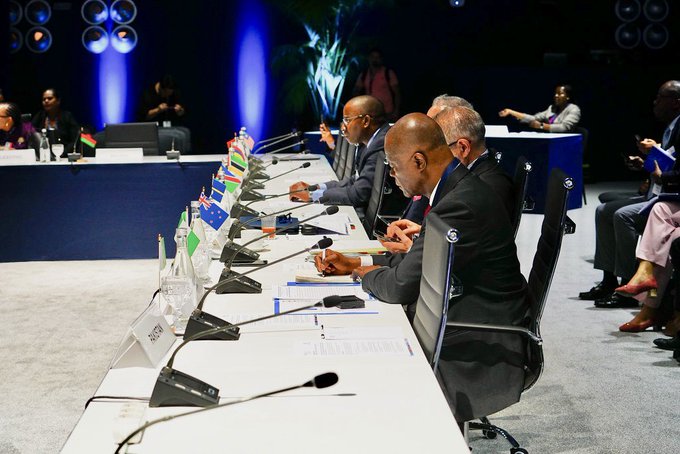Nigeria’s minister Wale Edun announced the country is to chair World Bank’s African Governors’ Forum, marking a diplomatic and economic shift, emphasizing unity for an energy transition, with potential global impact and investor interest in sustainable development. This revelation has stirred excitement, particularly among the business and investment community.
Wale Edun, the Minister of Finance and Coordinating Minister of the Economy, has revealed that Nigeria has been granted the role of chairing the African Governors’ Forum of the World Bank.
Edun reportedly disclosed this recently on the sidelines of the 2023 World Bank/ International Monetary Fund (IMF) annual meetings in Marrakech, one of the four imperial cities of Morocco.
He emphasized the opportunity that comes with Nigeria’s chairmanship, urging African leaders to rally behind a collective push for a fair and just energy transition, stressing the importance of a unified African voice to secure better deals for the continent.
This appointment signals a paradigm shift for Nigeria, marking the first time in 60 years the country will lead the African Governors’ Forum of the World Bank based on the established rotation system. The forum operates on a rotation system, typically adhering to the alphabetical order of African countries.
While Nigeria’s turn for chairmanship is slated for 2026, Edun’s assertion of a special appointment suggests a unique diplomatic move. The flexibility in rotation principles allows nations to adapt to prevailing exigencies, showcasing a willingness among African countries to collaborate for the greater good.
The forum serves as a platform for African nations to present a united front, articulating both individual and collective interests during the annual IMF and World Bank meetings. The chairman’s tenure, traditionally one year, can be extended based on group consensus, showcasing the adaptability of the forum to evolving dynamics. This contrasts with the previous tenure of two years, altered in 2013 to foster a more responsive and dynamic leadership structure.
This revelation has stirred excitement, particularly among the business and investment community. According to analysts, as Nigeria assumes this influential position within the World Bank’s framework, the eyes of the international community will be on the country to observe how it utilizes this opportunity to contribute to the economic advancement of not just Nigeria but the entire African region.
Nigerian analyst Kolawole Oyebola expresses optimism about the potential benefits for Nigeria’s economic landscape.
Oyebola emphasizes the significance of Nigeria’s chairmanship in fostering stronger economic collaboration across the African continent.
He tells FORBES AFRICA: “This presents a unique opportunity for Nigeria to play a pivotal role in shaping policies that address the diverse economic challenges faced by African nations. The chairmanship signifies not only a recognition of Nigeria’s economic prowess but also a responsibility to lead initiatives that can drive sustainable development.”
The analyst underscores the importance of leveraging this position to advocate for policies that stimulate economic growth, alleviate poverty, and address pressing issues such as infrastructure development and access to finance. Oyebola adds, “Nigeria’s leadership in the African Governors’ Forum provides a platform to influence decisions that can positively impact the lives of millions across the continent.”
However, he also highlights the challenges that come with such a role, urging the government to navigate diplomatically and collaborate effectively with other member nations. “Effective communication and consensus-building will be crucial in ensuring that the forum becomes a catalyst for meaningful change.”
Moses Adeolubodun, a Nigerian investor, anticipates the impact of Nigeria’s new leadership position. “This is a significant milestone for Nigeria and reflects the country’s growing influence on the global economic stage,” Adeolubodun tells FORBES AFRICA.
Adeolubodun notes that such leadership roles can enhance Nigeria’s image as a key player in the international financial landscape, potentially attracting more foreign investment. “Investors are likely to view this as a positive signal, indicating a stable and proactive approach to economic governance,” he explains.
While acknowledging the challenges ahead, Adeolubodun expresses confidence in Nigeria’s ability to leverage this opportunity for the benefit of the entire African continent.
